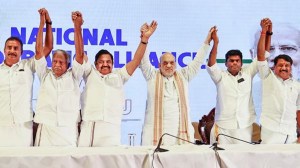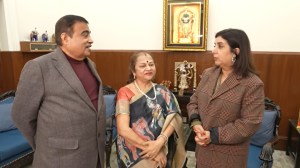Governor submits final report, ball in Centre146;s court
Karnataka8217;s political crisis moved to the Capital on Tuesday with Governor Rameshwar Thakur informing President Pratibha...

Karnataka8217;s political crisis moved to the Capital on Tuesday with Governor Rameshwar Thakur informing President Pratibha Patil and Union Home Minister Shivraj Patil about the numerical strength of the JDS-BJP combine. The Governor, who submitted his final report on Tuesday, is learnt to have referred to the numbers, indicating that this did not support dissolution of the state Assembly. The report also details the events of the past few days.
Thakur is believed to have voiced apprehensions about the current alliance and said that it might not be able to provide a very stable government. Any decision will now have to be taken by the Union Cabinet.
The AICC general secretary in-charge of Karnataka, Prithviraj Chavan, said the party maintains that the state Assembly should be dissolved because the opportunistic regrouping of the JDS and the BJP cannot provide a stable Government as there was a 8220;continuing split8221; in JDS. Out of the 57 JDS legislators, eight or nine have already dissociated themselves from the party8217;s decision to support a BJP-led Government.
8220;On the other hand, numbers are being paraded by the JDS and the BJP. The Governor has to act as per the Constitution. If at all the government is formed, it would be unstable,8221; said Chavan.
As the political drama unfolded in Bangalore, legal experts have been pointing out that the Centre would not recommend dissolution of the Assembly in a hurry. Such a decision would have to be approved by both the Houses of Parliament under clause 3 of Article 356. Any recommendation for dissolution of the Assembly will also have to pass the test of the Bommai and Bihar decisions.
The Karnataka situation has one thing in common with the Bommai and Bihar cases 8212; the Governor has the letters from the majority stating intention to support the Government. The dissolution recommended in the Bommai and Bihar cases were held to be unconstitutional by the Supreme Court. The only thing unique about the Karnataka crisis is that a coalition government in power had itself asked for imposition of the President8217;s rule as a result of the breakdown of the alliance on question of power sharing.
The view in legal circles is that, in the present situation, a bar on government formation will depend on the impression that the coalition is unstable and that the parties have come together only to avoid elections.
- 01
- 02
- 03
- 04
- 05































